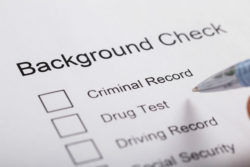Top Class Actions’s website and social media posts use affiliate links. If you make a purchase using such links, we may receive a commission, but it will not result in any additional charges to you. Please review our Affiliate Link Disclosure for more information.

Employees and job applicants have certain rights made clear by the Fair Credit Reporting Act (FCRA). This act applies not just to credit reports but also to many of the reports generated by background checks prepared as part of a job application.
Background checks might provide more information than you would imagine, but you do have rights.
What Does a Background Check Reveal?
If someone runs a background check on you, they may be able to find:
- Your full name and any aliases
- The name of your spouse and the names of any adult children
- Your date of birth
- Your current and previous home addresses
- Your home phone number and cell phone number
- Your current, and sometimes past, employers and your job titles
- Your educational background, degrees
- A list of your neighbors, both past and present
- Your financial history, including any liens or bankruptcies you’ve had
- Any criminal history
- Any lawsuits you have participated in as either a defendant or plaintiff
Consumers have the right not only to know a background check will be performed, but also must be informed of the impending inquiry in writing. The notification must be in a stand-alone document, and not consist of merely a mention at the bottom of an employment application.
The employer must tell the prospective employee that information contained in the background check report could be used to help the company determine whether or not to hire the applicant. The applicant then must provide signed consent to the background check.
Prior to an employer using any information from the background check to influence a rejection of the applicant, the employer must send a notice of the potential decision, a copy of the background check report and a copy of A Summary of Your Rights Under the Fair Credit Reporting Act to the applicant.
The applicant has the right to review the consumer report that was pulled and to correct any information that is wrong.
If you’re a job applicant who believes a decision was made unfairly against you, you may have grounds to appeal such a decision.
Lawsuit Regarding Employment Background Check
When prospective employers violate the FRCA, they can be held accountable through legal action.
In one case, plaintiffs filed a nationwide class action lawsuit against ATC Healthcare Services, Inc., a company that allegedly violated the FCRA by using an invalid authorization form. The form purportedly failed to provide a clear disclosure and did not provide a document that included only the said disclosure.
The plaintiffs further allege the “form is illegal because, in part, it includes a release and hold harmless clause that provides, ‘I release employers and persons named in my application from all liability for any damages on account of his/her furnishing said information.’”
Some companies opt to use a third-party provider to take care of pre-employment background checks. A company called Shareable for Hires claims it can search data from 370 million state and national criminal records, finding felonies, misdemeanors, most-wanted lists and sex offender registries.
However, even job applicants with criminal records are required to be judged on an individual basis. Many states don’t allow potential employers to inquire about criminal pasts unless a job candidate meets qualifications that get him/her to the interview level.
Employers also must have a policy that ensures all background checks are performed the same way. If only certain applicants are receiving criminal background checks, then the company could experience legal challenges due to the inconsistency of treatment among applicants.
Even though the FCRA is a federal law, individual states may have additional restrictions or guidelines that affect the legality of the company’s procedures.
The Employment Background Check Lawsuit is Case No. 3:19-cv-00295-L-BLM in the U.S. District Court for the Southern District of California.
Join a Free Employee Background Check Class Action Lawsuit Investigation
If a company performed a background check on you as part of the pre-employment process in the last 5 years, an experienced employment attorney can help you determine if the employer complied with federal rules during that process.
ATTORNEY ADVERTISING
Top Class Actions is a Proud Member of the American Bar Association
LEGAL INFORMATION IS NOT LEGAL ADVICE
Top Class Actions Legal Statement
©2008 – 2024 Top Class Actions® LLC
Various Trademarks held by their respective owners
This website is not intended for viewing or usage by European Union citizens.















One thought on Employment Background Check Must Follow FCRA Regulations
Add me